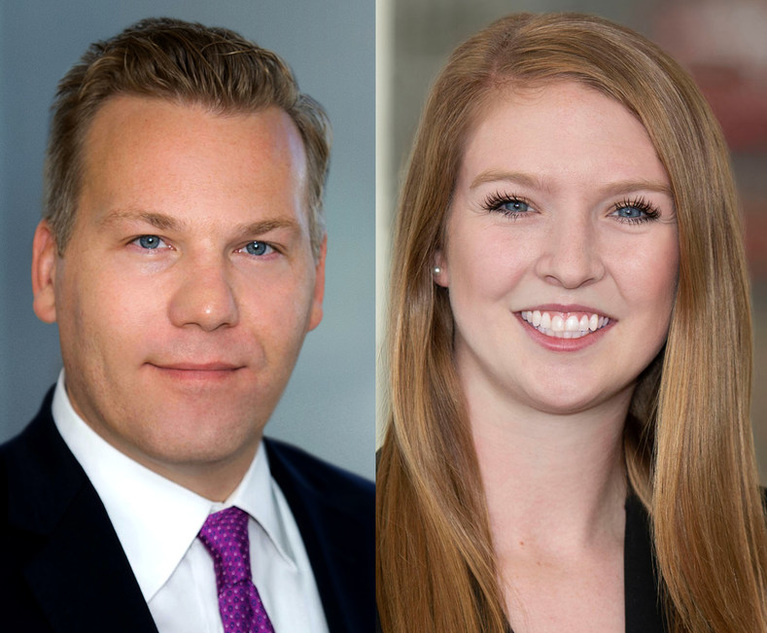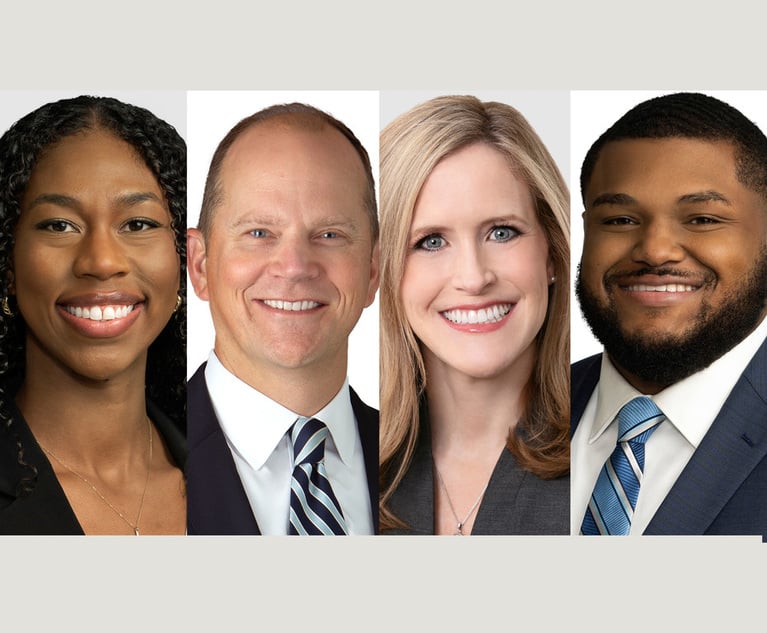 Cliff C. Gardner, left, and Peyton Carper, right, of Skadden, Arps, Slate, Meagher and Flom. Courtesy photos
Cliff C. Gardner, left, and Peyton Carper, right, of Skadden, Arps, Slate, Meagher and Flom. Courtesy photos Court of Chancery States That Delaware Is a 'Pro-Sandbagging' Jurisdiction
In "pro-sandbagging" states, a buyer's pre-closing knowledge of a breach does not prevent her from bringing a successful claim for breach of warranty. In "anti-sandbagging" states, a buyer who knew (or should have known) that the warranty was untrue is barred from recovering on a claim for breach.
June 29, 2022 at 09:00 AM
7 minute read
In the acquisition context, "sandbagging" refers to a buyer who knows at signing that a representation and warranty is false, but instead of alerting the seller, consummates the transaction and seeks post-closing damages against the breach. Sandbagging is so pervasive that transactional planners may negotiate to include a clause in the agreement that either expressly allows or expressly prohibits the practice. Despite the opportunity for private ordering, agreements are often silent on the issue. In the absence of explicit contractual language, jurisdictions are split on the permissibility of sandbagging. In "pro-sandbagging" states, a buyer's pre-closing knowledge of a breach does not prevent her from bringing a successful claim for breach of warranty. In "anti-sandbagging" states, a buyer who knew (or should have known) that the warranty was untrue is barred from recovering on a claim for breach. See Jacek Jastrzebski, "Sandbagging and the Distinction Between Warranty Clauses and Contractual Indemnities," 19 U.C. Davis Bus. L.J. 207, 209 (2019).
Though "characterizing a state as pro-sandbagging or anti-sandbagging may not provide a complete description of the relevant case law," California, Maryland and Texas are treated as anti-sandbagging jurisdictions, while New York is treated as a pro-sandbagging state. See Charles K. Whitehead, "Sandbagging: Default Rules and Acquisition Agreements," 36 DEL. J. CORP. L. 1081, 1091 (2011).
This content has been archived. It is available through our partners, LexisNexis® and Bloomberg Law.
To view this content, please continue to their sites.
Not a Lexis Subscriber?
Subscribe Now
Not a Bloomberg Law Subscriber?
Subscribe Now
NOT FOR REPRINT
© 2025 ALM Global, LLC, All Rights Reserved. Request academic re-use from www.copyright.com. All other uses, submit a request to [email protected]. For more information visit Asset & Logo Licensing.
You Might Like
View All
Elon Musk’s Tesla Pay Case Stokes Chatter Between Lawyers and Clients
7 minute read
Chancery: Common Stock Worthless in 'Jacobson v. Akademos' and Transaction Was Entirely Fair
5 minute read

Tesla, Musk Appeal Chancery Compensation Case to Delaware Supreme Court
2 minute readLaw Firms Mentioned
Trending Stories
Who Got The Work
J. Brugh Lower of Gibbons has entered an appearance for industrial equipment supplier Devco Corporation in a pending trademark infringement lawsuit. The suit, accusing the defendant of selling knock-off Graco products, was filed Dec. 18 in New Jersey District Court by Rivkin Radler on behalf of Graco Inc. and Graco Minnesota. The case, assigned to U.S. District Judge Zahid N. Quraishi, is 3:24-cv-11294, Graco Inc. et al v. Devco Corporation.
Who Got The Work
Rebecca Maller-Stein and Kent A. Yalowitz of Arnold & Porter Kaye Scholer have entered their appearances for Hanaco Venture Capital and its executives, Lior Prosor and David Frankel, in a pending securities lawsuit. The action, filed on Dec. 24 in New York Southern District Court by Zell, Aron & Co. on behalf of Goldeneye Advisors, accuses the defendants of negligently and fraudulently managing the plaintiff's $1 million investment. The case, assigned to U.S. District Judge Vernon S. Broderick, is 1:24-cv-09918, Goldeneye Advisors, LLC v. Hanaco Venture Capital, Ltd. et al.
Who Got The Work
Attorneys from A&O Shearman has stepped in as defense counsel for Toronto-Dominion Bank and other defendants in a pending securities class action. The suit, filed Dec. 11 in New York Southern District Court by Bleichmar Fonti & Auld, accuses the defendants of concealing the bank's 'pervasive' deficiencies in regards to its compliance with the Bank Secrecy Act and the quality of its anti-money laundering controls. The case, assigned to U.S. District Judge Arun Subramanian, is 1:24-cv-09445, Gonzalez v. The Toronto-Dominion Bank et al.
Who Got The Work
Crown Castle International, a Pennsylvania company providing shared communications infrastructure, has turned to Luke D. Wolf of Gordon Rees Scully Mansukhani to fend off a pending breach-of-contract lawsuit. The court action, filed Nov. 25 in Michigan Eastern District Court by Hooper Hathaway PC on behalf of The Town Residences LLC, accuses Crown Castle of failing to transfer approximately $30,000 in utility payments from T-Mobile in breach of a roof-top lease and assignment agreement. The case, assigned to U.S. District Judge Susan K. Declercq, is 2:24-cv-13131, The Town Residences LLC v. T-Mobile US, Inc. et al.
Who Got The Work
Wilfred P. Coronato and Daniel M. Schwartz of McCarter & English have stepped in as defense counsel to Electrolux Home Products Inc. in a pending product liability lawsuit. The court action, filed Nov. 26 in New York Eastern District Court by Poulos Lopiccolo PC and Nagel Rice LLP on behalf of David Stern, alleges that the defendant's refrigerators’ drawers and shelving repeatedly break and fall apart within months after purchase. The case, assigned to U.S. District Judge Joan M. Azrack, is 2:24-cv-08204, Stern v. Electrolux Home Products, Inc.
Featured Firms
Law Offices of Gary Martin Hays & Associates, P.C.
(470) 294-1674
Law Offices of Mark E. Salomone
(857) 444-6468
Smith & Hassler
(713) 739-1250






